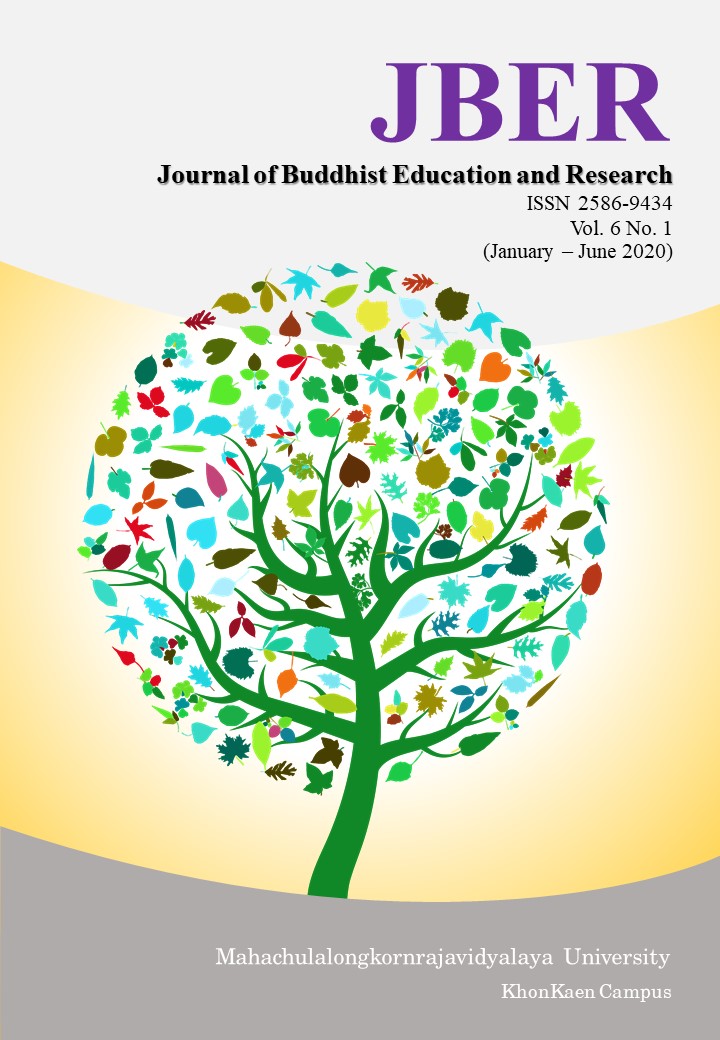การจัดการเรียนรู้ตามหลักสัปปุริสธรรม 7 สาระหน้าที่พลเมือง วัฒนธรรม และการดำเนินชีวิตในสังคม โรงเรียนเบ็ญจะมะมหาราช สังกัดสำนักงานเขตพื้นที่การศึกษามัธยมศึกษา เขต 29
คำสำคัญ:
การจัดการเรียนรู้ , หลักสัปปุริสธรรม 7, สาระหน้าที่พลเมือง วัฒนธรรม และการดำเนิน ชีวิตในสังคมบทคัดย่อ
การวิจัยนี้ มีวัตถุประสงค์ เพื่อศึกษาการจัดการเรียนรู้ เปรียบเทียบความคิดเห็นต่อสภาพการจัดการเรียนรู้ จำแนกตามระดับเกรดเฉลี่ยผลการเรียน เพศ และอาชีพผู้ปกครอง และเพื่อศึกษาแนวทางและข้อเสนอแนะในการพัฒนาและส่งเสริมการจัดการเรียนรู้ตามหลักสัปปุริสธรรม 7 สาระหน้าที่พลเมือง วัฒนธรรม และการดำเนินชีวิตในสังคม โรงเรียนเบ็ญจะมะมหาราช สังกัดสำนักงานเขตพื้นที่การศึกษามัธยมศึกษา เขต 29 ให้มีประสิทธิภาพสูงขึ้น รูปแบบวิจัยแบบผสม (Mixed Methodology Research) ได้แก่วิจัยเชิงคุณภาพ (Quantitative Methodology Research) กับวิจัยเชิงปริมาณ (Quantitative Research) เครื่องมือใช้แบบสอบถามกลุ่มตัวอย่างจำนวน 250 คน กลุ่มเป้าหมายในการสัมภาษณ์ (ln-depth Interview) ได้แก่ ผู้บริหารสถานศึกษาและครูผู้สอน จำนวน 15 คน
ผลการวิจัย พบว่า
การจัดการเรียนรู้ตามหลักสัปปุริสธรรม 7 สาระหน้าที่พลเมือง วัฒนธรรม และการดำเนินชีวิตในสังคม โรงเรียนเบ็ญจะมะมหาราช ทั้ง 7 ด้าน โดยภาพรวมค่าเฉลี่ยอยู่ในระดับมากส่วนรายด้าน พบว่า อยู่ในระดับมากที่สุดเพียง 1 ข้อ ได้แก่ ด้านปุคคลัญญุตา เป็นผู้รู้จักบุคคล นอกนั้นอยู่ในอยู่ในระดับมากทุกข้อ เรียงจากมากไปหาน้อย ด้านธัมมัญญุตา เป็นผู้รู้จักเหตุ ด้านอัตถัญญุตา เป็นผู้รู้จักผล ด้านอัตตัญญุตา เป็นผู้รู้จักตน ด้านกาลัญญุตา เป็นผู้รู้จักกาล ด้านมัตตัญญุตา เป็นผู้รู้จักประมาณ ด้านปริสัญญุตา เป็นผู้รู้จักบริษัท ตามลำดับ
การวิเคราะห์เปรียบเทียบการปฏิบัติตนตามความคิดเห็นการจัดการเรียนรู้ตามหลักสัปปุริสธรรม 7 สาระหน้าที่พลเมือง วัฒนธรรม และการดำเนินชีวิตในสังคม โรงเรียนเบ็ญจะมะมหาราช จำแนกตามระดับเกรดเฉลี่ยผลการเรียน โดยภาพรวมมีระดับการปฏิบัติไม่แตกต่างกัน และเมื่อแยกเป็นรายด้าน คือ ด้านปุคคลัญญุตา เป็นผู้รู้จักบุคคล มีระดับการปฏิบัติที่แตกต่างกันอย่างมีนัยสำคัญทางสถิติที่ระดับ 0.05 ซึ่งสอดคล้องกับสมมุติฐานที่ตั้งไว้ จำแนกตามเพศ โดยภาพรวมมีความแตกต่างกันอย่างมีนัยสำคัญทางสถิติที่ระดับ 0.05 ซึ่งสอดคล้องกับสมมติฐานที่ตั้งไว้ ยกเว้นด้านธัมมัญญุตา เป็นผู้รู้จักเหตุ ด้านอัตถัญญุตา เป็นผู้รู้จักผล ด้านอัตตัญญุตา เป็นผู้รู้จักตน ด้านมัตตัญญุตา เป็นผู้รู้จักประมาณ ด้านกาลัญญุตา เป็นผู้รู้จักกาล ด้านปริสัญญุตา เป็นผู้รู้จักบริษัท ที่ระดับปฏิบัติไม่แตกต่างกัน และจำแนกตามอาชีพผู้ปกครอง โดยภาพรวมมีความแตกต่างกันอย่างมีนัยสำคัญทางสถิติที่ระดับ 0.05 ซึ่งสอดคล้องกับสมมติฐานที่ตั้งไว้ ยกเว้นด้านปริสัญญุตา เป็นผู้รู้จักบริษัท ที่ระดับปฏิบัติไม่แตกต่างกัน
ข้อเสนอแนะการจัดการเรียนรู้ตามหลักสัปปุริสธรรม 7 นั้นคือควรออกแบบการเรียนรู้การแก้ปัญหาและปรับปรุงการเรียนรู้โดยใช้ความคิดสร้างสถานการณ์จริงหรือบทบาทสมมติวิเคราะห์สภาพปัญหาปัจจุบันสาเหตุของปัญหาสร้างเครื่องมือที่เหมาะสมและใช้อย่างถูกต้องเหมาะสมสร้างความสัมพันธ์ที่ดีต่อชุมชนสังคมสิ่งแวดล้อมสำรวจปัญหาจุดเด่นและจุดด้อยของผู้เรียนส่งเสริมให้ผู้เรียนพัฒนาการความสามารถตนเองอย่างเติมศักยภาพ มุ่งส่งเสริมพัฒนาผู้เรียนมีเหตุมีผล ความพอประมาณ มีภูมิคุ้มกัน มีความสุขทางด้านร่างกาย จิตใจ อารมณ์ ครอบครัว ชุมชน สังคม เพื่อประโยชน์ต่อการปฏิบัติตนของผู้เรียน
เอกสารอ้างอิง
ชุติมาภรณ์ ค้าขาย. (2562). อิทธิพลของสื่อสังคมออนไลน์ต่อพฤติกรรมเบี่ยงเบน ของเด็กและเยาวชนในเขตกรุงเทพมหานคร. วารสารสังคมสงเคราะห์ศาสตร์. 27(2), 194-227
พระพรหมคุณาภรณ์ (ป.อ. ปยุตฺโต). (2547). ธรรมนูญชีวิต. กรุงเทพฯ: โรงพิมพ์การศาสนาสำนักงานพระพุทธศาสนาแห่งชาติ.
มหาวิทยาลัยมหาจุฬาลงกรณราชวิทยาลัย. (2559). พระไตรปิฎกภาษาไทย. กรุงเทพฯ: โรงพิมพ์มหาจุฬาลงกรณราชวิทยาลัย.
วิรัช ถิรพันธุ์เมธี. (2546). พุทธปรัชญาการปกครอง. กรุงเทพฯ: โรงพิมพ์บริษัทสหธรรมิกจำกัด.
Krejcie, R. V. & Morgan, D. W. (1970). Determining Sample Size for Research Activities. Educational and Psychological Measurement.





